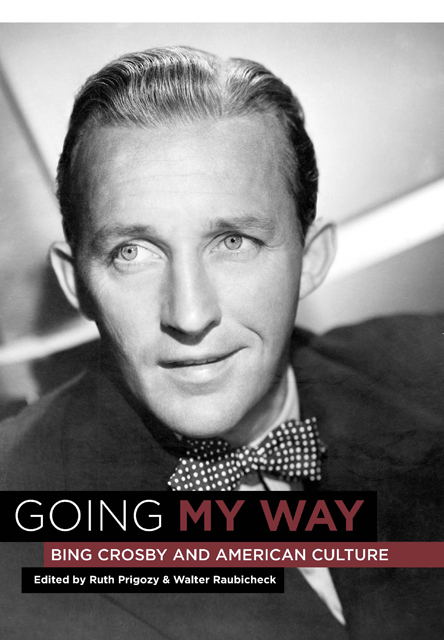Book contents
- Frontmatter
- Dedication
- Contents
- List of Illustrations
- Foreword
- Preface
- Acknowledgments
- Introduction Bing Crosby—Nothing Is What It Seems
- Part 1 Theoretical Perspectives on Crosby
- Part 2 Cultural Perspectives on Crosby
- Part 3 Historical Perspectives on Crosby
- Personal Comments
- Selected Bibliography
- List of Contributors
- Index
13 - Bing's Entertainment and War Bond Sales Activities During World War II
Published online by Cambridge University Press: 11 March 2023
- Frontmatter
- Dedication
- Contents
- List of Illustrations
- Foreword
- Preface
- Acknowledgments
- Introduction Bing Crosby—Nothing Is What It Seems
- Part 1 Theoretical Perspectives on Crosby
- Part 2 Cultural Perspectives on Crosby
- Part 3 Historical Perspectives on Crosby
- Personal Comments
- Selected Bibliography
- List of Contributors
- Index
Summary
“What did you do in the war, daddy?”
If Bing Crosby's children had asked him that, they would no doubt have a gotten a very modest and understated reply, because, as we know, that was his style. But what did he do? Did he enlist and fly bombing missions like Clark Gable? Did he fight on the front line like Audie Murphy? Was he classified as being medically unfit like Frank Sinatra? Did he register as a conscientious objector like Lew Ayres? Well, actually, he did none of those things.
After the attack on Pearl Harbor, the House and Senate required that all men aged twenty to forty-four years register for the draft, and Crosby, who was then aged thirty-eight, duly did so. From interviews he gave around that time he fully expected to be called up. However, as a married man with dependents, he was a long way down the priority list for being drafted.
Crosby had been as shocked as anyone following that day of infamy in late 1941. His career was reaching its peak with his huge record sales and the popularity of his film, Birth of the Blues, which premiered two days after Pearl Harbor. He was the star of the prestigious radio program, The Kraft Music Hall, and in the show broadcast on Christmas Day 1941, he sang “White Christmas” for the first time on the air.
Crosby wanted to do as much as possible for the war effort, pending being drafted, but it soon became evident that he was unlikely to be conscripted because of his age, his family, and possibly because he was considered an “essential industry.” It does seem that he was very embarrassed about not being called up and it was evidently decided that Crosby could do more to help the war effort by entertaining and boosting war bond sales than by donning a uniform.
- Type
- Chapter
- Information
- Going My WayBing Crosby and American Culture, pp. 141 - 150Publisher: Boydell & BrewerPrint publication year: 2007



